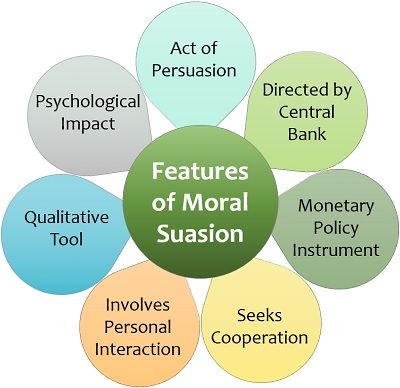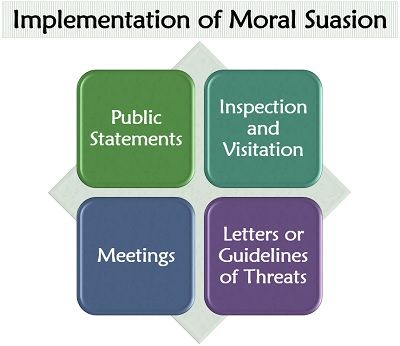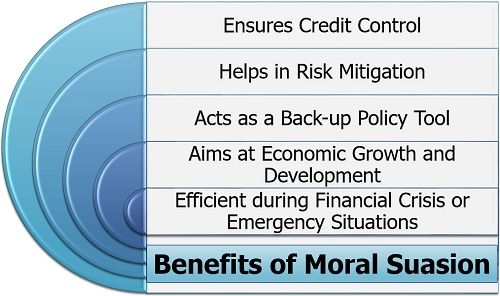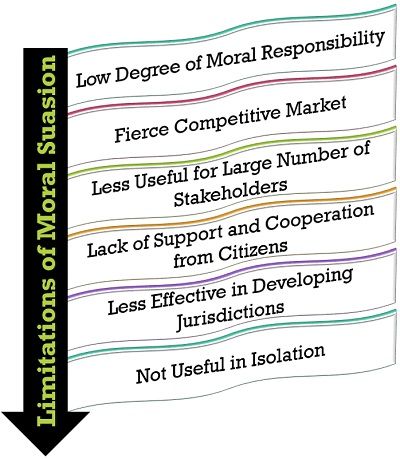Definition: Moral suasion is a step taken by the central bank for convincing and advising the commercial banks to adhere to the policies and act in the desired manner through general interaction. ‘Moral’ means defining one’s code of conduct based on a clear distinction between right and wrong. ‘Suasion’ refers to the process of advising, convincing or influencing others without forcing or punishing them.
Example of ‘Moral‘ is speaking the truth always, and that of ‘Suasion‘ is when a teacher advises her students to work hard for the exams.
Now let us understand the concept of ‘Moral Suasion‘ with the help of an example;
After demonetization in India on Nov 8, 2017, the governor advised the banks to be lenient with the farmers at the time currency exchange and ensure even flow of money in rural areas.
Content: Moral Suasion
- Features of Moral Suasion
- Implementation of Moral Suasion
- Benefits of Moral Suasion
- Limitations of Moral Suasion
- Conclusion
Features of Moral Suasion
Moral suasion has gained significance in developed countries as an efficient monetary policy instrument. To better understand this concept, let us figure out its critical elements:
- Qualitative Tool: It is a qualitative tool used for price stability and growth of an economy through credit control.
- Act of Persuasion: It is all about changing the mind and influencing the stakeholders such that they cooperate to the policy instruments by themselves, without any use of force or pressure.
- Directed by Central Bank: For economic welfare and interest, the central bank directs and persuades the commercial banks to adhere to the monetary and credit policy instruments.
- Monetary Policy Instrument: The principal intention of moral suasion is to gain cooperation from the stakeholders to adhere to specific policies and guidelines.
- Seeks Cooperation: It is not related to enforcing the stakeholders to follow the decisions. Instead, it is an act of convincing them to cooperate and adhere to the policy instruments willingly.
- Involves Personal Interaction: It consists of a lot of jawboning, through informal and formal interactions. Like holding meetings, releasing public statements, making inspections and visits and issuing letters or guidelines.
- Psychological Impact: It aims at influencing the stakeholders such that they are self-driven to cooperate with the monetary authorities in the successful implementation of the policies.
Implementation of Moral Suasion
From the above explanation, we have understood the concept of moral suasion. Let us now discuss the various means of applying it practically accomplish the defined objectives:
- Public Statements: While practising moral suasion on a vast level or making something public, a government official securing a high position, is considered to be trustworthy and an expert in his field. Therefore, this public figure announces or appeals to the group to adhere to specific policy or guidelines. This type of moral suasion creates an impact on the financial market.
- Inspection and Visitation: The monetary authority at times hold surprise inspections and frequent visits by officials to eliminate the chances of non-compliance to the policy guidelines by going through the records, working and other evidence of the selective banks or stakeholders.
- Meetings: The monetary authority’s official arranges meetings with stakeholders (preferable where stakeholders are less in number). To have a personal interaction for discussing guidelines and listening to their views on the implementation of such guidelines.
- Letters or Guidelines of Threats: Central bank issues some policy guidelines to seek cooperation from particular economic agents. It may also use the means of indirect threats in exceptional cases when its advice is not taken seriously.
Benefits of Moral Suasion
Moral suasion is practised vastly by the central bank to ascertain the economic well-being of a country. To know more about its various other advantages, read below:
- Credit Control: Moral suasion is a tactic followed by the central banks of different countries to convince and restrict commercial banks from providing credit to a particular sector.
- Helps in Risk Mitigation: The monetary authorities use moral suasion to keep control over the payment and settlement system of the economic agents and stakeholders to mitigate the risk of non-payments and bad-debts.
- Acts as a Back-up Policy Tool: It acts as a backup plan when the other monetary policy instruments fail to give the desired results solely. Thus, moral persuasion is used to implement policy instruments effectively.
- Aims at Economic Growth and Development: The motive of moral suasion is to ensure stability, welfare and growth of a country’s economy.
- Efficient during Financial Crisis or Emergency Situations: It is the most dynamic economic tool for the central banks at the time of short-term crisis like inflation, recession, war, demonetization, etc. to maintain financial stability.
Limitations of Moral Suasion
Moral suasion though is a widely used technique of credit control; it has numerous drawbacks too. The significant barriers related to its applicability are as follows:
- Low Degree of Moral Responsibility: It is not very successfully applied in the countries where moral responsibility is less prioritised or not taken into consideration.
- Fierce Competitive Market: The practice of moral persuasion is less effective in the economic markets with high competition. It is due to the presence of many competitors that everyone is concerned about their existence, rather than morality.
- Less Useful for a Large Number of Stakeholders: There are a large number of economic agents who are to be persuaded. Therefore, it is difficult to identify the ones who do not comply with the policies and requires to be penalised.
- Lack of Support and Cooperation from Citizens: In the country where the citizens lack faith and trust in their government, the moral suasion fails in the absence of their support and cooperation.
- Less Effective in Developing Jurisdictions: In developing countries, people are less aware and conscious of their moral responsibilities. Moreover, they don’t even consider moral suasion as a policy instrument.
- Not Useful in Isolation: It cannot function solely. It needs to be implemented in addition to the other monetary policy instruments to get the desired results.
Conclusion
Moral suasion does not aim at monetary benefits only, but it is also used to bring economic stability to a country.
The only criticism of moral suasion is that it is not backed up by legal consequences or force of law. Neither it is an official regulation where non-compliance results into punishments or penalties.
Leave a Reply